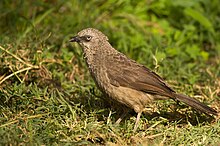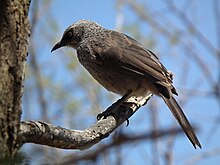| Black-lored babbler | |
|---|---|

| |
| At Lake Naivasha, Kenya | |
| Conservation status | |
 Least Concern (IUCN 3.1) | |
| Scientific classification | |
| Domain: | Eukaryota |
| Kingdom: | Animalia |
| Phylum: | Chordata |
| Class: | Aves |
| Order: | Passeriformes |
| Family: | Leiothrichidae |
| Genus: | Turdoides |
| Species: | T. sharpei |
| Binomial name | |
| Turdoides sharpei (Reichenow, 1891) | |
The black-lored babbler or Sharpe's pied-babbler (Turdoides sharpei) is a species of bird in the family Leiothrichidae. It is found in southwestern Kenya, Tanzania, Uganda, Burundi, Rwanda, and the part of the Democratic Republic of the Congo immediately adjacent to the three last-named countries. This bird was formerly considered the same species as Turdoides melanops of southern Africa, now known as the black-faced babbler.
These birds are mostly grey-brown with white mottling, especially on the underparts, that varies according to location and the individual. The population near Nanyuki, Kenya, is darker but can have a pure white chin or entire throat. The combination of pale yellow or white eyes and black lores (the areas between the eye and the bill) separates adults of this species from similar babblers except melanops, though all juvenile babblers have brown eyes.
In Kenya, single birds give repeated single or double harsh notes such as waaach or a muffled kurr-ack; pairs or groups give longer phrases in chorus. The tempo is frequently slow for a babbler. They are most vocal in the early morning and late afternoon.
Like other Turdoides, it is found low or on the ground in or near dense woody vegetation, including in cultivated areas. Kenyan birds forage in bushes and tall grass. They are "restless, noisy, and suspicious" and "typical gregarious babblers".
Single birds give repeated single or double harsh notes such as waaach or a muffled kurr-ack; pairs or groups give longer phrases in chorus. The tempo is frequently slow for a babbler. They are most vocal in the early morning and late afternoon.
References
- ^ BirdLife International (2016). "Turdoides sharpei". IUCN Red List of Threatened Species. 2016: e.T22716462A94495776. doi:10.2305/IUCN.UK.2016-3.RLTS.T22716462A94495776.en. Retrieved 13 November 2021.
- ^ Zimmerman, Dale A.; Turner, Donald A. & Pearson, David J. (1999). Birds of Kenya and Northern Tanzania, Field Guide Edition. Princeton University Press. pp. 196–197, 435. ISBN 0-691-01022-6.
- Pedersen, Tommy (2001). "Democratic Republic of CONGO - A bird checklist". Archived from the original (zip) on 25 February 2006. Retrieved 3 August 2007. See also this site Archived September 28, 2007, at the Wayback Machine where one can request an updated checklist.
- ^ Zimmerman, Dale A.; Turner, Donald A. & Pearson, David J. (1996). Birds of Kenya and Northern Tanzania. Princeton University Press. pp. 196–197, 435. ISBN 0-691-02658-0.
- Collar, N. J. & Robson, C. 2007. Family Timaliidae (Babblers) pp. 70 – 291 in; del Hoyo, J., Elliott, A. & Christie, D.A. eds. Handbook of the Birds of the World, Vol. 12. Picathartes to Tits and Chickadees. Lynx Edicions, Barcelona.

